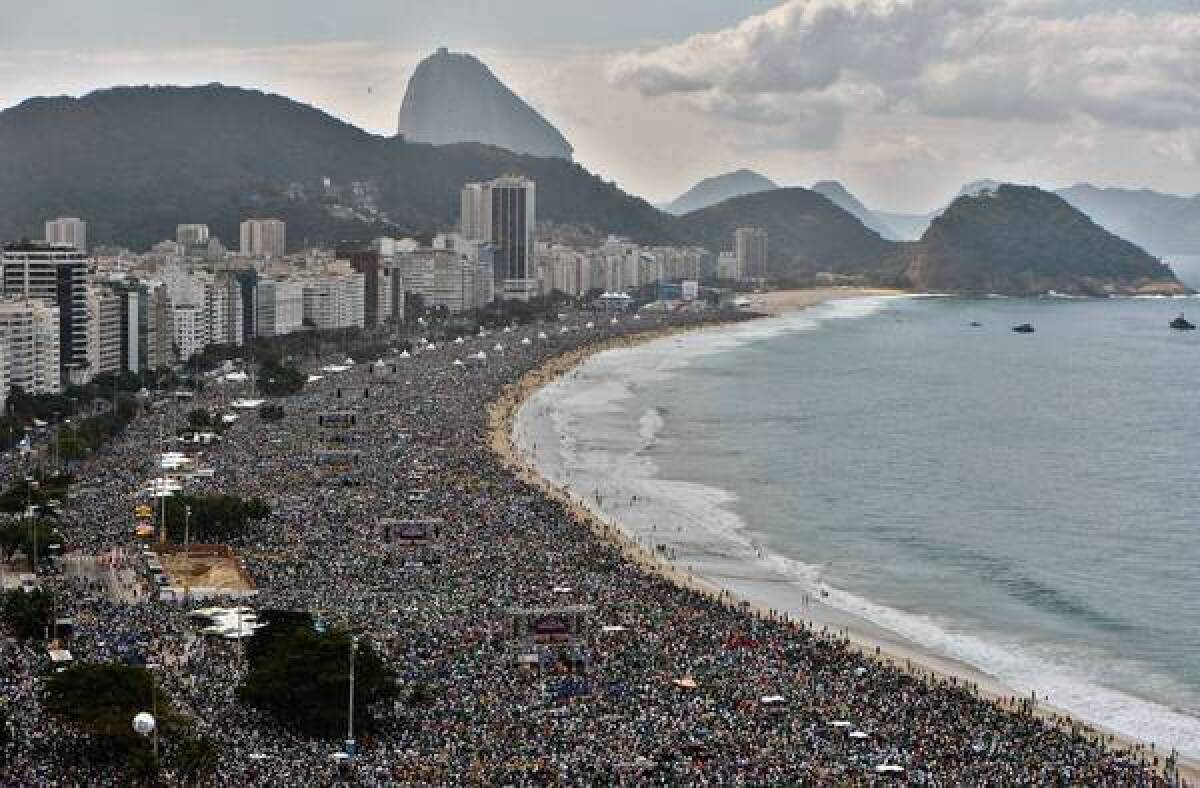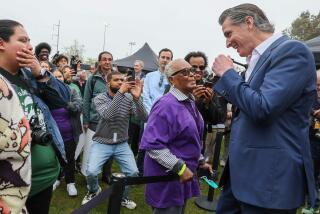Pope Francis’ trip to Brazil seen as a roaring success

- Share via
RIO DE JANEIRO — He kissed seemingly countless babies hoisted to his popemobile. He exchanged white beanies with people in the crowds and caught the soccer jerseys, flags and who-knows-what-else hurled his direction. He scolded the Brazilian elite, both ecclesiastic and secular, on the many ways they are failing their people.
Pope Francis, first pontiff from the Americas, has been both grandfatherly icon and stern cajoler, combining charm with serious teachings, in a weeklong pilgrimage to the world’s largest Roman Catholic country, which wrapped up Sunday.
His widely acknowledged success on his first overseas trip as pontiff will surely strengthen his hand as he returns to a troubled Vatican that he is determined to reform and as he faces the beginnings of a backlash from conservatives.
On the flight that returned him to Rome on Monday, the pope made conciliatory remarks about the roles of gays and women in the Roman Catholic Church and allowed that the troubled Vatican bank may have to be shut down altogether.
But, while the Argentine-born Francis wooed enormous crowds in Brazil — a reported 3 million filled the crescent-shaped Copacabana beach for a prayer vigil Saturday night and then slept over ahead of Sunday’s final Mass — it is far less clear that he has changed many Brazilian minds in a country that is less Catholic every day.
In his final homily Sunday, at one of the largest papal Masses in recent history, Francis again urged the young to spread the Gospel to “the fringes of society,” to reach beyond their comfort zones to help rebuild a church that has suffered debilitating decline in Latin America, a region once dominated almost exclusively by Catholicism.
He allowed numerous elements into the Mass from the Catholic charismatic movement, a theologically conservative but theatrically boisterous strain that many see as the best answer to the down-to-earth evangelicals who have lured millions of worshipers away from the Catholic Church.
“Jesus is calling you to be a disciple with a mission!” the pope said. “There are no borders, no limits: He sends us to everyone.”
As the Mass was winding down and worshipers took Communion, other pilgrims jumped into the sea for a brisk swim. Later, the pious and the partially clad shared the powdery sands.
Francis has consistently reiterated the key leitmotifs of this pilgrimage: working for the poor, the need for social justice in countries with huge rich-poor gaps, aggressive evangelism — all ways to recoup the church’s influence.
His receptions, from the cherished shrine of Our Lady Who Appeared in central Brazil, to gatherings of top Brazilian leaders and lowly young prisoners, to a notorious slum, have been enthusiastic.
“The Francis program — a church of and with the poor, nourished by popular devotion, firm on teaching but radical in its directness … and boldly evangelizing — has been launched in Rio,” said Austen Ivereigh, a commentator with Catholic Voices, an advocacy group, who traveled to Rio.
“Its success means that Francis will have the authority and the legitimacy to carry through reforms in Rome and elsewhere,” Ivereigh said. “The feeling here … is that Francis may be resisted, but he’s unstoppable.”
Zuenir Ventura, a columnist with the leading O Globo newspaper, alluded to regional rivalries and noted, somewhat tongue-in-cheek, two miracles: Brazilians going crazy over an Argentine, and an Argentine who was actually humble. “Can you think of any other?” Ventura asked.
Some of Francis’ messages, however, may fall on deaf or indifferent ears.
The centerpiece of this trip was Francis’ decision to wade into a slum, or favela, so violent and poor it is sometimes called the Gaza Strip. There, on Thursday, he chatted with residents, scolded the government for not doing more for the poor and prayed at the small, stone St. Jeronimo Emiliano church.
On Sunday, as the faithful heard the pope on Copacabana beach, the church was chained shut — even as hundreds of people flocked to the nearby evangelical house of worship.
“For the whole week, no one here could talk about anything but the pope’s visit,” said Rafael Ribeiro Marques, a 27-year-old resident of the Varginha slum, acknowledging that the neighborhood was spruced up with newly paved streets. “But the people that live here are in dire need of more [permanent] improvements” such as healthcare.
The pope told “vested interests” in Brazil -- code for the traditional and deeply entrenched economic powers that dominate the nation -- that they must respect human rights, share the wealth, even stop destroying the land of indigenous Amazonian tribes. Few Brazilian analysts expected any of that to come about.
“It will probably be business as usual” once the pope is gone, said Julita Lemgruber, a former Brazilian police ombudswoman who studies civilian security issues. The pope, she noted, singled out the 1993 Candelaria massacre, when police killed eight homeless youths sheltering at a church. “But the police killings keep going on and on and on,” she said.
The pope won praise among some Brazilians for focusing on poverty and the need for political activism instead of potentially more divisive issues such as abortion and gay marriage, issues where many young Catholics diverge from their pastors’ conservative teachings.
Francis seemed to endorse the mostly young demonstrators who have been taking to the streets here since last month to demand an end to corruption, excessive government spending and lack of basic services such as education and healthcare.
“The pope’s telling us to listen to the voice of the streets, that was good,” said Pedro Abramovay, a human rights activist and professor at the Getulio Vargas Foundation law school in Rio. “It reinforces this important political moment in Brazil … when there is a great opportunity to reshape Brazilian democracy.”
Of all his comments, Francis was perhaps most critical of the church’s failure to stop the hemorrhaging of members to rival denominations, which he blamed on numerous factors, including an adherence to rigid rules and intellectualism over the “grammar of simplicity.”
Brazil is the world’s largest Catholic country. But, according to census data and a recent poll, the percentage of Brazilians who identify as Catholics has declined by 6 percentage points in just the last three years, to 57%. And among 16- to 24-year-olds, the number of Catholics has fallen to 44%, while 38% say they are Protestants, which here almost always means membership in an evangelical church.
Andrew Chesnut, an author and professor of religious studies at Virginia Commonwealth University, said inclusion of the charismatic elements in Sunday’s Mass was a positive step.
But the gesture is also overdue, in part because discussion of social justice, a favored Francis theme, remains esoteric for many of Latin America’s poorest, while the evangelicals offer more concrete and immediate benefits, Chesnut said.
“This has the potential for sparking a revitalization of the church,” Chesnut said of the pope’s week in Brazil. “But nobody can stop the trend of pluralization of religions.”
By nearly every account, the trip has been a roaring success for Francis, who has displayed his ease with pilgrims and his accessible messages, despite considerable logistical troubles such as failing public transportation that stranded worshipers and overly strained electrical and water systems.
“It’s been like Teflon for the pope where the [organizational] problems are concerned,” said Francis X. Rocca, Rome bureau chief for the Catholic News Service. “He goes back to Rome with his prestige definitely enhanced.”
A mean task awaits him there.
He is forgoing the usual papal summer in the Castel Gandolfo outside Rome and is instead expected to shake up the Vatican’s equivalent of a Cabinet with new appointments. Already, though, he seems to be meeting resistance, or at least controversy. Two key appointments to a team meant to launch much-needed oversight of Vatican administration are being attacked in some Italian media circles as, on one hand, an indiscreet gay priest and, on the other, an indiscreet Twitter-user.
In comments to reporters on the flight to Rome, the pope said that he opposed any type of lobby that might try to influence his decisions. He was responding to a question about the so-called gay lobby inside the Vatican that some officials have alleged exists as a cabal of gay priests who run the Holy See.
He said it was important to distinguish between a lobby, which he did not approve of, and priests or other Catholics who might be gay.
“If a person is gay, seeks God and has good will, who am I to judge?” Francis said. “They should not be marginalized.”
The church has traditionally labeled homosexuality a “disorder,” and under Pope Benedict XVI, who resigned in February, men with “deep-seated tendencies” toward homosexuality were to be barred from the priesthood. Francis’ comments seemed to back away from an absolute ban.
On women, he repeated the church position that they cannot be priests. But he added women should not be “limited to being altar girls” and should be given expanded administrative roles in the church.
On the scandal-plagued Vatican bank, suspected of being used to launder millions of dollars, Francis said he would heed the advice of a five-member special oversight committee. But he said he did not know whether the bank could be saved or must be closed.
“Whatever the solution, it must have transparency and honesty,” Francis said.
Even on his lone day of rest here, after a flight of more than 15 hours, Francis was reported to be working on problems back in Rome. Maybe that is what he had in mind as he bade farewell to his native continent Sunday night.
“Already I am beginning to miss Brazil,” he said. “I shall miss the warm and natural smiles.”
Special correspondent Vincent Bevins contributed to this report.
More to Read
Sign up for Essential California
The most important California stories and recommendations in your inbox every morning.
You may occasionally receive promotional content from the Los Angeles Times.











